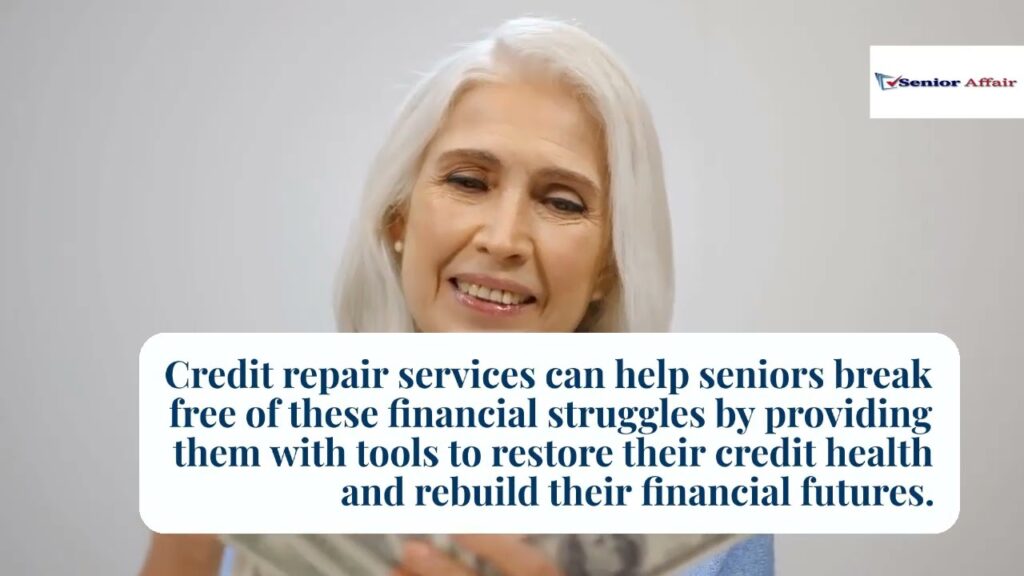In this article, you will learn about credit repair strategies that will help seniors retire with confidence. We will cover various topics such as the basics of credit scores, how to fix errors on your credit report, and debunking common myths about credit repair. Additionally, we will provide tips on building credit, managing late payments, and the difference between credit repair and debt settlement. Our goal is to give you the knowledge and tools to successfully repair your credit and ensure a secure retirement. So let’s get started!
One important aspect of credit repair for seniors is understanding the impact of credit utilization. We will discuss how to effectively manage your credit utilization ratio and explain why it is important to keep it low. Additionally, we will provide tips on how to negotiate with creditors and explore strategies for dealing with collections and charge-offs. By implementing these credit repair strategies, you will not only improve your credit score but also gain the confidence and peace of mind to enjoy your retirement to the fullest. Stay tuned for valuable insights and actionable tips to help you achieve your credit repair goals.
Understanding Credit Scores
What is a credit score?
A credit score is a numerical representation of an individual’s creditworthiness. It is a three-digit number that ranges from 300 to 850, with a higher score indicating better creditworthiness. Your credit score is used by lenders, landlords, and other financial institutions to evaluate your ability to manage debt and make timely payments.
How is a credit score calculated?
Credit scores are calculated based on several factors, including:
-
Payment history: This accounts for the largest percentage of your credit score and includes factors such as on-time payments, late payments, and any accounts in collections.
-
Credit utilization: This measures the amount of available credit you are using. Keeping your credit utilization ratio low (below 30%) is important for maintaining a good credit score.
-
Length of credit history: The longer your credit history, the more data lenders have to assess your creditworthiness.
-
Credit mix: Having a diverse mix of credit accounts, such as credit cards, loans, and mortgages, can positively impact your credit score.
-
New credit: Opening several new credit accounts in a short period can negatively impact your credit score.
Why is a good credit score important?
A good credit score is important for several reasons, especially for seniors who are planning for retirement. Here are some key reasons why a good credit score is important:
-
Lower interest rates: A good credit score can help you secure loans and credit cards with lower interest rates. This can save you a significant amount of money in interest payments over time.
-
Access to credit: A good credit score makes it easier to qualify for credit cards, loans, and other financial products. This can be especially important for seniors who may need access to credit for emergencies or unexpected expenses.
-
Housing options: Landlords often check credit scores when considering rental applications. A good credit score can increase your chances of being approved for a rental property.
-
Insurance premiums: Some insurance companies use credit scores to determine insurance premiums. A good credit score can help you secure lower premiums for auto, home, and other types of insurance.
-
Employment opportunities: Some employers may check credit scores as part of the background check process. A good credit score can enhance your employment prospects, especially for certain job positions that require financial responsibility.
Identifying and Fixing Errors
How to check your credit report for errors
Checking your credit report regularly is essential for seniors who want to ensure the accuracy of their credit information. Here’s how you can check your credit report for errors:
-
Request a free credit report: Under federal law, you are entitled to one free credit report per year from each of the three major credit bureaus: Experian, Equifax, and TransUnion. You can request your free credit reports online or by mail.
-
Review your credit report: Once you receive your credit reports, carefully review them for any errors or discrepancies. Look for incorrect personal information, accounts that don’t belong to you, and any negative information that should have been removed.
-
Dispute inaccuracies: If you find any errors on your credit report, you have the right to dispute them. Contact the credit bureau in writing and provide supporting documentation to prove the inaccuracies. The credit bureau is required to investigate the dispute within 30 days and remove any errors if necessary.
Disputing inaccuracies on your credit report
If you discover inaccuracies on your credit report, it’s essential to take action to correct them. Here are the steps to dispute inaccuracies on your credit report:
-
Gather supporting documentation: Collect any documentation that proves the inaccuracies on your credit report. This may include canceled checks, payment receipts, or letters from creditors.
-
Write a dispute letter: Draft a letter to the credit bureau that clearly explains the inaccuracies and provides supporting evidence. Be sure to include your personal information and account details.
-
Send the dispute letter: Send the dispute letter to the credit bureau via certified mail with a return receipt requested. This way, you have proof that the credit bureau received your dispute.
-
Follow up regularly: Keep track of the progress of your dispute and follow up with the credit bureau if necessary. They are required to investigate the dispute within 30 days and provide a response.
Monitoring your credit regularly
Monitoring your credit regularly is a proactive way to keep track of any changes or inaccuracies on your credit report. Here are a few strategies to help you monitor your credit effectively:
-
Set up credit monitoring alerts: Many credit monitoring services offer real-time alerts for changes to your credit report. These alerts can help you detect any suspicious activity or errors on your credit report.
-
Review your credit card and loan statements: Regularly review your credit card and loan statements for any unauthorized charges or errors. Report any discrepancies to the respective financial institution immediately.
-
Take advantage of free credit score services: Several financial institutions and credit card companies offer free credit score monitoring services. Take advantage of these services to keep track of your credit score and any changes over time.
-
Consider identity theft protection: Identity theft can have a devastating impact on your credit and financial wellbeing. Consider enrolling in an identity theft protection service that can help monitor your personal information and alert you to potential fraud.

This image is property of i.ytimg.com.
Debunking Credit Repair Myths
Common myths about credit repair
There are many myths and misconceptions surrounding credit repair. It’s important to debunk these myths to ensure seniors have accurate information when it comes to improving their credit. Here are some common myths about credit repair:
-
Myth: You can erase negative information from your credit report. Fact: Negative information, such as late payments or collections, cannot be removed if accurate. However, negative information will generally have less impact on your credit score over time.
-
Myth: You need to hire a credit repair company to fix your credit. Fact: While credit repair companies can offer assistance, you can also take steps to repair your credit on your own. Many of the strategies and techniques used by credit repair companies can be done individually at no cost.
-
Myth: Closing credit accounts will improve your credit score. Fact: Closing credit accounts can actually lower your credit score. It reduces your available credit and can negatively impact your credit utilization ratio. It’s often better to keep credit accounts open, especially if they have a long history of on-time payments.
-
Myth: Paying off your debts will instantly improve your credit score. Fact: While paying off debts is an important step in improving your credit, it may not result in an immediate increase in your credit score. It takes time for creditors to update your information and for your credit score to reflect the positive changes.
Separating fact from fiction in credit repair
Now that we’ve debunked some common myths about credit repair, let’s separate fact from fiction to help seniors make informed decisions about their credit. Here are some key facts about credit repair:
-
Fact: Negative information typically stays on your credit report for seven years, while bankruptcies can remain for up to ten years. However, the impact of negative information lessens over time, especially if you establish a pattern of responsible financial behavior.
-
Fact: You have the right to dispute inaccuracies on your credit report. The Fair Credit Reporting Act (FCRA) gives you the ability to challenge any information that is incorrect, outdated, or incomplete.
-
Fact: Making timely payments is one of the most effective ways to improve your credit score. Paying your bills on time shows creditors that you are responsible and can be trusted to repay loans.
-
Fact: Building and maintaining good credit takes time and consistency. It requires a combination of responsible borrowing, on-time payments, and regular monitoring of your credit.
By understanding the facts and debunking common credit repair myths, seniors can take control of their credit and make informed decisions that will lead to a more secure financial future.
Building and Rebuilding Credit
Strategies for building credit from scratch
If you have little or no credit history, it’s essential to start building credit to establish a solid financial foundation. Here are some strategies for building credit from scratch:
-
Open a secured credit card: A secured credit card requires a cash deposit as collateral, making it a great option for those with no credit history. Use the card responsibly and make on-time payments to build your credit.
-
Become an authorized user: Ask a trusted family member or friend if they can add you as an authorized user on their credit card. Their history of responsible credit usage can help boost your credit score.
-
Apply for a credit builder loan: Some financial institutions offer credit builder loans specifically designed to help individuals build credit. These loans typically have low loan amounts and are secured by your savings account.
-
Use alternative credit reporting services: Some credit reporting agencies, such as Experian Boost, consider alternative credit data like utility bills and rental payments when calculating your credit score. By signing up for these services, you can potentially boost your credit score.
Rebuilding credit after financial setbacks
Sometimes, seniors may face financial setbacks that can negatively impact their credit. However, it’s possible to rebuild credit and regain financial stability. Here are some strategies for rebuilding credit after financial setbacks:
-
Create a budget: Take a close look at your income and expenses to create a realistic budget. Prioritize essential expenses and develop a plan to pay off any outstanding debts.
-
Pay on time: Make it a priority to pay all bills on time, as late payments can have a significant impact on your credit score. Consider setting up automatic payments or reminders to help you stay on track.
-
Pay off outstanding debts: If you have outstanding debts, work on paying them off as soon as possible. Consider prioritizing debts with higher interest rates to save on interest payments.
-
Use credit sparingly: Keep your credit utilization ratio low by only using a small percentage of your available credit. Avoid taking on new credit while you focus on paying off existing debts.
Rebuilding credit takes time and discipline, but with careful planning and consistent effort, seniors can improve their credit scores and achieve financial stability.

This image is property of img.money.com.
Managing Credit Utilization
Understanding credit utilization ratio
Credit utilization ratio is the percentage of your available credit that you are using. It is an important factor in calculating your credit score. Here’s how to calculate your credit utilization ratio:
Credit Utilization Ratio = (Total Credit Card Balances) / (Total Credit Card Limits)
For example, if you have a total credit card balance of $2,000 and a total credit card limit of $10,000, your credit utilization ratio would be 20%.
Tips for keeping credit utilization low
Maintaining a low credit utilization ratio is crucial for maintaining a good credit score. Here are some tips to help you keep your credit utilization low:
-
Pay your balances in full: Aim to pay off your credit card balances in full each month. This not only helps you avoid interest charges but also keeps your credit utilization ratio low.
-
Use multiple credit cards: Instead of maxing out a single credit card, consider using multiple credit cards responsibly. This can help distribute your debt and keep your credit utilization ratio low.
-
Increase your credit limit: If you have a good track record of making on-time payments, consider contacting your credit card issuer to request a credit limit increase. This can help lower your credit utilization ratio.
-
Keep track of your spending: Regularly monitor your credit card balances and spending to ensure you are staying within your credit limits and keeping your credit utilization ratio low.
By practicing responsible credit utilization habits, seniors can maintain a healthy credit score that will positively impact their financial future.
Dealing with Late Payments
The impact of late payments on credit scores
Late payments can have a significant negative impact on your credit score. Here’s how late payments affect your credit:
-
Timeliness of payment: Creditors report late payments to the credit bureaus after 30 days. The longer the payment is late, the more it will impact your credit score.
-
Credit history: Late payments can stay on your credit report for up to seven years, depending on the severity.
-
Creditworthiness: Lenders and other financial institutions may view late payments as a sign of financial irresponsibility. This can make it more difficult to secure loans and credit in the future.
Strategies for catching up on missed payments
If you’ve missed a payment, it’s crucial to take action to minimize the impact on your credit score. Here are some strategies for catching up on missed payments:
-
Pay immediately: As soon as you realize you’ve missed a payment, pay it as soon as possible. The longer the payment remains unpaid, the more it can negatively impact your credit score.
-
Contact the creditor: If you’re unable to make the full payment, contact the creditor and explain your situation. They may be willing to work with you to establish a payment plan or offer temporary relief.
-
Set up automatic payments: Automate your payments to prevent future missed payments. Schedule automatic payments for at least the minimum amount due to ensure you avoid late payment fees and penalties.
-
Prioritize payments: If you’re struggling to make all your payments, prioritize essential expenses such as housing and utilities. Contact non-essential creditors to negotiate a payment plan or discuss alternative options.
By taking prompt action and implementing strategies to catch up on missed payments, seniors can minimize the damage to their credit score and work towards financial stability.

This image is property of img.money.com.
Credit Repair vs. Debt Settlement
Understanding the difference between credit repair and debt settlement
Credit repair and debt settlement are two different strategies for individuals looking to improve their financial situation. Here’s a breakdown of the difference between the two:
-
Credit repair: Credit repair focuses on improving your credit score by addressing errors, inaccuracies, and negative information on your credit report. It involves disputing inaccurate information, improving payment history, and managing credit utilization.
-
Debt settlement: Debt settlement involves negotiating with creditors to reduce the overall amount you owe in exchange for a lump sum payment. This strategy is typically used when individuals are unable to make full payments on their debts.
It’s important to determine which approach is right for your specific financial situation. Consulting with a financial advisor or credit counselor can help you make an informed decision.
Choosing the right approach for your situation
When deciding between credit repair and debt settlement, it’s essential to consider your financial goals and circumstances. Here are some factors to consider when choosing the right approach:
-
Financial situation: If you’re struggling with overwhelming debt and cannot make payments, debt settlement may be a viable option. However, if you have manageable debt and are primarily looking to improve your credit score, credit repair may be more suitable.
-
Credit goals: If your primary goal is to improve your credit score and build a strong credit history, credit repair is the better approach. Debt settlement may have a negative impact on your credit score, as settled accounts are reported differently than accounts in good standing.
-
Available resources: Credit repair can often be done independently with the right knowledge and resources. Debt settlement, on the other hand, may require professional help from a debt settlement company or attorney.
-
Long-term impact: Consider the long-term impact of each approach. Credit repair focuses on improving your overall creditworthiness, which can have lasting benefits. Debt settlement, while providing immediate relief, may have a negative impact on your credit and future borrowing opportunities.
Before making a decision, thoroughly research and consult with professionals to determine the best approach for your specific financial situation and goals.
Handling Collections and Charge-offs
Dealing with collection agencies
If you have accounts that have been sent to collections, it’s important to know how to handle collection agencies. Here are some steps to take when dealing with collection agencies:
-
Validate the debt: Request written verification of the debt from the collection agency. Under the Fair Debt Collection Practices Act (FDCPA), you have the right to request proof that you owe the debt.
-
Review the statute of limitations: Each state has a statute of limitations, which determines how long a debt is legally enforceable. If the debt is past the statute of limitations, you may not be legally obligated to pay it.
-
Negotiate a settlement: If you determine that the debt is valid and within the statute of limitations, you can negotiate a settlement with the collection agency. Offer to pay a portion of the debt in exchange for the account being reported as “paid in full.”
-
Get any agreements in writing: Always get any agreements or settlements with collection agencies in writing. This will protect you in case of any future disputes.
Remember to carefully review your rights under the FDCPA and consult with a consumer protection attorney if you encounter any issues or if your rights have been violated.
The effects of charge-offs on credit scores
A charge-off occurs when a creditor writes off a debt as uncollectible. While it may seem like a relief, a charge-off can have significant negative effects on your credit score. Here’s how charge-offs impact your credit:
-
Credit score impact: Charge-offs can cause a significant drop in your credit score, as they are considered severe delinquencies. The negative impact can stay on your credit report for up to seven years.
-
Difficulty obtaining credit: A charge-off makes it difficult to obtain new credit, as lenders see it as evidence of a history of not repaying debts.
-
Collection efforts: Even after a charge-off, the creditor may still attempt to collect the debt or sell it to a collection agency. This can result in continued collection efforts and potential legal action.
While charge-offs can have serious repercussions, it’s essential to address them and take steps towards repairing your credit.

This image is property of image.cnbcfm.com.
Exploring Credit Repair Companies
Benefits and drawbacks of hiring credit repair companies
Credit repair companies can be a valuable resource for individuals looking to improve their credit. Here are some benefits and drawbacks of hiring credit repair companies:
Benefits:
-
Expertise and knowledge: Credit repair companies have extensive knowledge of credit laws and can navigate the complexities of disputing inaccuracies on your credit report.
-
Time-saving: Repairing your credit can be a time-consuming process. Credit repair companies can handle the communication and paperwork on your behalf, saving you time and effort.
-
Legal protection: Credit repair companies are familiar with consumer protection laws, such as the FCRA and FDCPA. They can protect your rights and ensure that your credit report is accurate and fair.
Drawbacks:
-
Cost: Credit repair companies typically charge fees for their services. Depending on the extent of the credit repair needed, these fees can add up over time.
-
Dependency: Hiring a credit repair company may create a sense of dependency, as you may rely on their expertise to navigate the credit repair process.
-
Not guaranteed success: While credit repair companies can improve your credit, there are no guarantees. It’s important to manage your expectations and understand that results can vary.
When considering hiring a credit repair company, do thorough research, read reviews, and carefully consider the benefits and drawbacks before making a decision.
How to choose a reputable credit repair company
If you decide to hire a credit repair company, it’s crucial to choose a reputable one that will effectively address your credit repair needs. Here are some tips for choosing a reputable credit repair company:
-
Research and reviews: Conduct online research and read reviews from past customers. Look for companies with a track record of success and positive customer experiences.
-
Check for certifications: Verify if the credit repair company has any relevant certifications or accreditations. For example, the National Association of Credit Services Organizations (NACSO) certifies reputable credit repair companies.
-
Transparent pricing: Request a detailed breakdown of the fees and services offered by the credit repair company. Avoid companies that have high upfront fees or promise unrealistic results.
-
Free consultation: Look for credit repair companies that offer a free consultation. This allows you to discuss your specific credit repair needs and assess if the company is a good fit for you.
-
Client references: Ask the credit repair company for references from past clients who have successfully improved their credit. Speaking directly to these individuals can provide valuable insights into the company’s effectiveness.
By doing your due diligence and thoroughly researching credit repair companies, you can find a reputable organization that will assist you in improving your credit.
Conclusion
Retiring with financial confidence requires seniors to prioritize their credit repair strategies. By understanding the basics of credit scores, identifying and fixing errors, debunking credit repair myths, building and rebuilding credit, managing credit utilization, dealing with late payments, understanding the differences between credit repair and debt settlement, handling collections and charge-offs, exploring credit repair companies, and knowing how to choose a reputable credit repair company, seniors can take control of their credit and enjoy a more secure retirement. By following these strategies and incorporating them into their financial routines, seniors can retire with confidence and peace of mind.

This image is property of images.squarespace-cdn.com.
